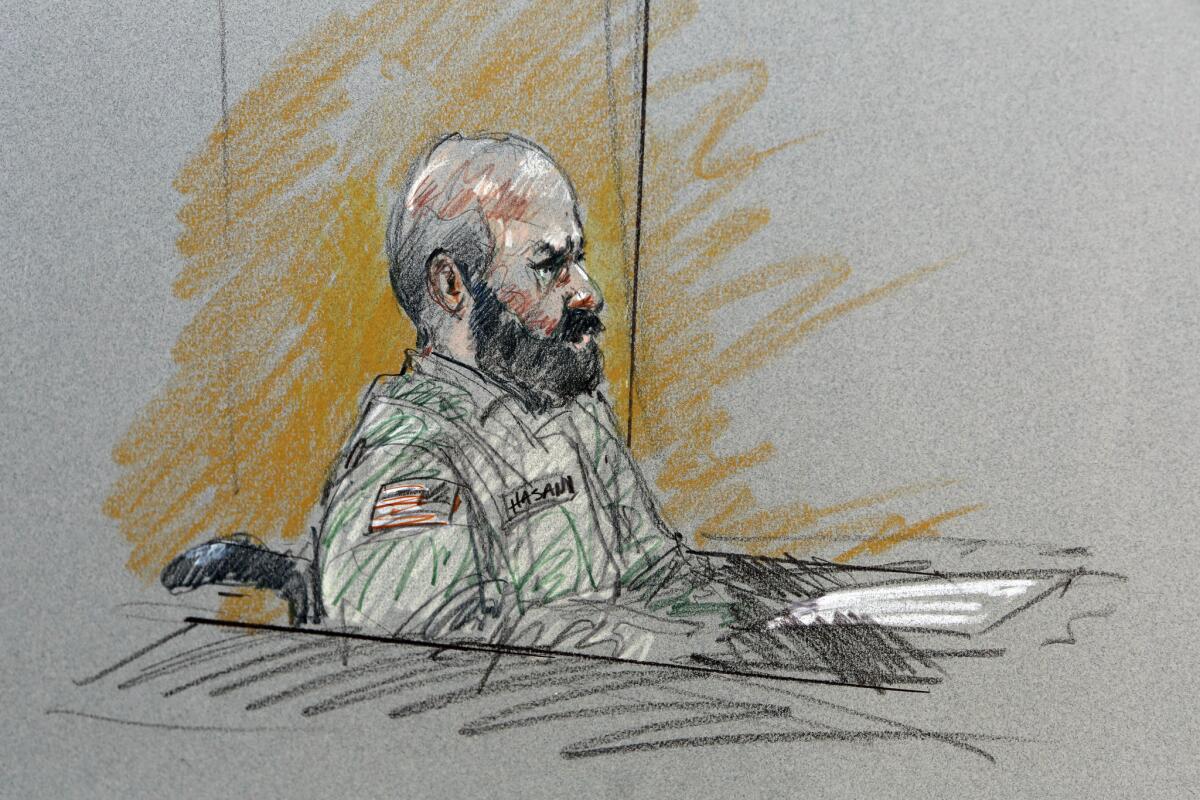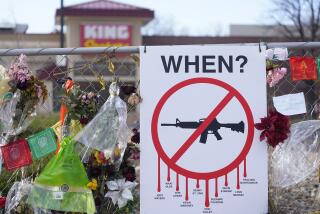Attorney says Ft. Hood shooter trying to ‘achieve’ death penalty

- Share via
FT. HOOD, Texas -- Military lawyers advising accused Ft. Hood shooter Major Nidal Malik Hasan at his court-martial on Wednesday asked the judge to modify their role in the high-stakes trial, saying Hasan appears to be seeking the death penalty and that to assist him would be “repugnant.”
At a court hearing, the military lawyers did not explicitly say they wished to withdraw from the case, but did argue that a change in their “status” was necessary.
“We stand ready to defend Maj. Hasan should he decide he stands ready to fight the death penalty. We stand ready today. However, since that does not seem to be the case, we ask that we be standby counsel and not be asked to assist him in achieving his goal,” said Lt. Col. Kris Poppe, Hasan’s lead military advisor.
Hasan, 42, is representing himself as he faces 13 counts of premeditated murder and 32 counts of attempted premeditated murder in connection with the Nov. 5, 2009, shooting. If convicted by the 13-member jury, all fellow officers of his rank or higher, the American-born Muslim faces a possible death sentence.
In June, the military judge granted Hasan’s request to defend himself, ordering his three military attorneys to stay on as legal advisors or standby counsel.
The Army psychiatrist, who has no legal training, has since attempted to argue that he shot unarmed fellow soldiers preparing to deploy as a way of protecting Taliban allies overseas, a defense the judge as rejected. Hasan had been scheduled to deploy Nov. 28, 2009.
Hasan has also attempted to plead guilty, which is not allowed under military law in capital cases.
On Tuesday, the first day of testimony, Hasan admitted to the shooting, identified his gun in evidence and called himself a Muslim guerrilla fighter.
Prosecutors have argued that Hasan was motivated by his unwillingness to deploy and a belief that he had a duty to wage jihad, or holy war, killing as many soldiers as possible while sparing civilians.
On Wednesday Poppe said Hasan was trying to “achieve” the death penalty and to assist him would violate his professional legal standards. He called Hasan’s jury selection “totally inadequate” with “a multitude of issues” including the fact that Hasan did not challenge prospective jurors or question seven of the 13 selected.
He also made reference to Fox News, which Hasan had sent documents through his civil attorney.
“His goal is to remove obstacles to the death penalty, and he is in fact working towards the death penalty,” Poppe said.
“Your honor, I object!” Hasan interjected. “That is a twisting of the facts!”
The military judge, Col. Tara Osborn, said the lawyers’ request was confusing, and questioned Poppe’s assertion that Hasan was seeking a death sentence. She said Hasan’s approach to jury selection was a “difference in strategy” and that not challenging prospective jurors could be considered “a brilliant strategy” to select “one outlier [juror] who might vote against the death penalty.” (Hasan did question some prospective jurors.)
Osborn offered Hasan a chance to respond during a closed hearing with his legal advisors or in writing, but he objected.
“I want this to be done now,” Hasan said, “I just want to clarify Col. Poppe’s assertion of me seeking the death penalty.” The assertion, he said, was “inaccurate.”
Osborn decided to conduct the hearing anyway, closing the courtroom to all but Hasan and his advisers at 10:16 a.m. CDT, about a half hour after proceedings had started. Soon after, Ft. Hood spokesmen announced that court was in recess until 9 a.m. Thursday.
The judge sealed the military lawyers’ request and ordered prosecutors to return it, noting it appeared to contain “privileged work product” between Hasan and his jury consultant. Col. Michael Mulligan, the lead prosecutor, said he had reviewed part of the request and that he was “concerned about it.”
Richard Rosen, a retired colonel and professor of law at Texas Tech University School of Law in Lubbock, said Wednesday’s proceedings, which he watched, were unprecedented.
“I’ve never seen anything like this in 26 years of active duty,” Rosen said.
He said Poppe was basically arguing that “the position he’s been put in is untenable.” He also noted that the judge was concerned that information in the defense request was privileged and shouldn’t be shared with prosecutors or discussed in open court because it could jeopardize the case.
“Everything that is happening now is grounds for appeal,” Rosen said.
He said the judge will likely compel Hasan’s standby attorneys to stay on, “but the question is what their role will be.”
Hasan’s conduct Wednesday was a departure from the start of the trial, when he had appeared passive.
Osborn has had to explain some legal terms and procedures, but only a handful of times, and she has yet to admonish him. Hasan has declined to cross-examine any of the victims who have testified and has only briefly questioned two witnesses. He rarely objects, challenges military prosecutors or consults his standby attorneys.
It’s relatively unheard of for a military defendant to represent himself, experts have said, especially in a capital case.
Some military legal experts had speculated that Hasan might overstep, pontificating or making mistakes that could cause friction with the judge, prompt a mistrial or become grounds for appeals.
As usual, he appeared in court in a wheelchair Wednesday, paralyzed from the chest down after he was shot by a police officer who responded to the shooting. He wore fatigues instead of the customary dress uniform and a full beard he has refused to shave in defiance of Army regulations, citing his religious beliefs.
Hasan has only submitted one piece of evidence: a glowing performance evaluation filed by a supervisor on the eve of the shooting, a supervisor whom he briefly cross-examined Tuesday, along with a Muslim man who testified he knew Hasan from a local mosque.
Hasan plans to call two witnesses. It was not clear Wednesday who they are or if he plans to take the stand.
Prosecutors have said they plan to call up to 270 witnesses, and they have called a dozen so far. A dozen had been expected to testify Wednesday.
The judge has said she expects the trial to last at least a month.
ALSO:
Ariel Castro’s house of horror demolished in Cleveland
Death of obese Ohio inmate escalates death penalty debate
Powerball jackpot, from East to West coast, reaches $425 million
More to Read
Sign up for Essential California
The most important California stories and recommendations in your inbox every morning.
You may occasionally receive promotional content from the Los Angeles Times.











